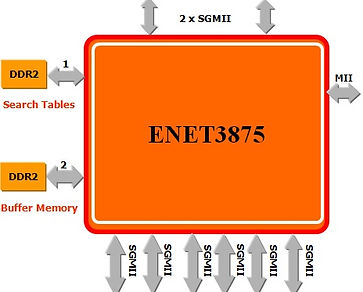top of page

The Programmable Network
Carrier Ethernet Switch:
Carrier Grade Ethernet Services can support a range of applications more easily, efficiently and cost-effectively than other network services. Using standard Ethernet interfaces, subscribers can set up secure, private Ethernet Virtual Connections across a Metropolitan Area, or even a Wide Area, to connect their sites together and connect to business partners, suppliers and the Internet. Using point-to-point E-Line Services and multipoint E-LAN Services, subscribers can connect to one site or many. With service options such as Service Multiplexing, subscribers can use a single UNI to support multiple connections. Additionally, with many Ethernet services, subscribers can buy just the bandwidth they need today, knowing that they can quickly and easily add bandwidth and set up new connections whenever they need to. In order to support a wide range of applications and subscriber needs, Ethernet Services come in different types, with different service attributes. Ethernet Services will undoubtedly evolve to take advantage of advances in Ethernet technology and provide innovative new service features. However, it is clear that Ethernet Services will continue to provide the benefits of simplicity, cost effectiveness and flexibility that are unmatched for a wide range of applications.
The ENET access flow processors (AFP) are the first devices in the industry implemented on a low cost FPGAs and combines the best aspects of programmable logic with the best aspects of interface customization, packet processor and traffic Management on a single FPGA chip. This combination is designed to deliver optimized product differentiation, maximum flexibility, field upgradeability and lowest power consumption.
The ENET3875 AFP targets Carrier Grade Ethernet Access equipment, and is equiped with 8 3.25G internal SERDESs. The ENET3875 performs advanced header parsing, pattern matching, bit manipulation, classification, packet modification, data movement, Inverse multiplexing, EFM bonding and Hierachical traffic management. It complies with all MEF requirements .
Figure 1 shows the ENET3xxx in Ethernet Access Device.
The ENET48xx AFP targets Carrier Grade Ethernet aggregation and 10G Demarcation units equipment, and is equipped with 8 x 12G internal SERDESs to serve different Ethernet port types including RGMII, SGMII, QSGMII ( 4x SGMII) , RXUAI, and XFI. The ENET48xx performs advanced header parsing, pattern matching, bit manipulation, classification, packet modification, data movement, andHierarchical traffic management. It complies with all MEF requirements .
Figure 2 . 40Gbps Carrier Ethernet Switch on FPGA
Solution Overview
The ENET AFP solution enables Metro Ethernet Equipment Vendors providers to offer enterprise customers the operational cost benefits of Ethernet with the predictable QoS characteristics Per customer Ethernet Virtual Channel (EVC) including dedicated queue per EVC. Complete the service mix - ensuring that service providers can confidently mix and match E-Line and E-LAN VPN services based on what their customers want.
Ethernity Networks created a new class of low-cost, high-performance flow processor/traffic manager solutions optimized for metro access applications. Ethernity Network's ENET Access Flow Processor uses 28nm FPGA as its vehicle platform and includes a field-proven, wire-speed pipeline architecture supporting up to 10-Gbps throughput on Xilinx Spartan 6 FPGAs, and 40Gbps on Xilinx's Kintex 7 FPGA.
The platform includes L2/L3/L4 switching, NAT/PAT, ATM SAR, EFM Bonding, programmable L2 to L5 classification, header processing supporting any type of protocol header, and comprehensive traffic management. The traffic management function includes MEF policing, Hierarchical QoS,Hierarchical Shaping and scheduling and traffic shaping per port/logical port/ priority .
The ENET interworking protocol includes software support for packet editing, which provides the ability to receive packets in any format and change the protocol per flow to any other protocol, hence supporting , Ethernet II, SNAP, Q-in-Q, MAC-in-MAC, MPLS, PPP, PPPoE, L2TP, or any type of L2 protocol.
Features & Benefits
-
Deterministic 40Gbps Metro Ethernet Packet Processor provides programmable protocol termination, built-in hardware accelerators that accelerate traffic management, Search functions, filtering, Editing, manage EVC QoS, and maintain Service Level Agreements (SLAs).
-
The only and First NPU and Traffic manager solution on lowest cost Pin Compatible 28nm FPGA devices offer a low-cost, small footprint, low power, FPGA-based packet processor solution for Metro Ethernet, FTTx, MSAM, and other access equipment line cards.
-
Integrated search engine using a single DDR3 Memory that search up to 1M entries.
-
Virtual/ logical port connection less switching
-
Five levels packet header & payload manipulation
-
MPLS-TP, VPLS/VPWS
-
PBB, PBT
-
ACL
-
Pseudo Wire
-
Fragment frames L2/L3/L4 switch, supporting EFM Bonding
-
Hierarchical Scheduling, policing and shaping
-
G.999.1 standard fragmentation
-
Y.1731, 802.1ag, OAM /CFM1588v2
-
SyncE
-
NAT/PAT
-
Deep Buffering supporting up to 100ms buffering.
-
Integrated Multi Ethernet MAC, to support aggregation of multiple ports on single device
-
Low Power
-
Flexibility, Configurability & Field Upgradeability
-
Superior Price/Performance
-


Related Documents
bottom of page